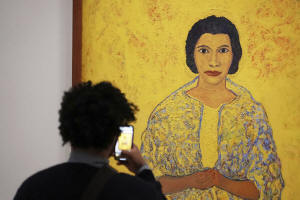150 artists of African descent celebrated in 'Black Paris' exhibition at
Pompidou Center
[March 18, 2025]
By SYLVIE CORBET
PARIS (AP) — An unprecedented exhibition at the Pompidou Center in Paris
explores the presence and influence of Black artists in the city from
the 1950s to 2000, offering a vibrant immersion in France's cosmopolitan
capital and a history of anti-colonial, civil rights struggles.
The “Black Paris” exhibition features the works of about 150 major
artists of African descent, many of whom have never or rarely been
displayed in France before. Running from March 19 to June 30, it's one
of the final shows before the museum closes for a five-year renovation
later this year.
Éva Barois De Caevel, associate curator, said that the exhibition is
“unprecedented,” with more than 300 paintings and sculptures by artists
of various backgrounds.
“Some are African Americans, some are Caribbeans, some are Africans, and
some are Afro-descendants,” said Barois De Caevel, adding that the focus
of the exhibit is not geography or race, but rather “Black
consciousness,” shaped by the history of slavery and experience of
racism shared by Black artists.
After World War II, many African American painters, musicians, and
intellectuals flocked to Paris, seeking a sense of freedom that they
couldn't find in the United States at the time. Barois De Caevel pointed
out that for many, Paris represented a break from the racial segregation
that they faced back home.
“Many enjoyed being free in the streets of Paris — being able to go out
with white women, enter cafes, bars and restaurants, and be treated like
white people,” she said.

“But they were not fooled," she added, noting that African American
writer James Baldwin "wrote about this early on, that in France, racism
is especially targeting Black Africans and Algerians, who were really
extremely mistreated. So it’s an ambivalent relationship with Paris.”
The exhibition also shows how many African artists from French colonies
— and later former colonies — came to Paris to join a political and
intellectual movement fighting for civil rights and racial justice,
while others from the Caribbean were supporting independentist
movements, which were gaining strength there.
[to top of second column]
|

A man photographs the 1965 painting "Marian Anderson" by Beauford
Delaney at the Black Paris exhibition which explores the presence
and influence of about 150 Black artists in France from the 1950s to
2000 at the Pompidou Center, Monday, March 17, 2025 in Paris. (AP
Photo/Nicolas Garriga)

Alicia Knock, curator of the exhibition, praised the ambitious scope of
the show, which she described as “an incredible epic of decolonization,”
highlighting how Paris city served as both a “lab for Pan-Africanism,”
the movement that encouraged solidarity between peoples of African
descent, and an “anti-colonial workshop.”
Visitors “will see how these artists contributed to rewriting the
history of modernism and postmodernism,” Knock said, and how they
”reframed abstraction and surrealism, and at the same time you will also
see the Black solidarities that happened at the time.”
"Many of these artists were not only creators, but also cultural
ambassadors, teachers, poets, and philosophers,” she added.
For some coming from the U.S., Paris was also “a gateway to Africa,”
Knock said, based on discussions she had with some of the artists'
families: "They told us that, in fact, they had come to Paris to go to
Africa, and in the end they found Africa in Paris.”
The exhibition also includes installations from four artists chosen to
provide contemporary insights, including Shuck One, a Black graffiti and
visual artist native of the Caribbean island of Guadeloupe.
In addition, the Pompidou Center has acquired around 40 of the show's
artworks, which will remain part of the museum’s collection.
“This is just the beginning,” Knock said. “It’s a baby step for many
French institutions, French museums and French universities to start
working on these artists, start collecting them, writing about them,
preserving their works in their archives and hopefully dedicating a lot
of solo shows to many of these artists, because they really deserve it."
All contents © copyright 2025 Associated Press. All rights reserved |